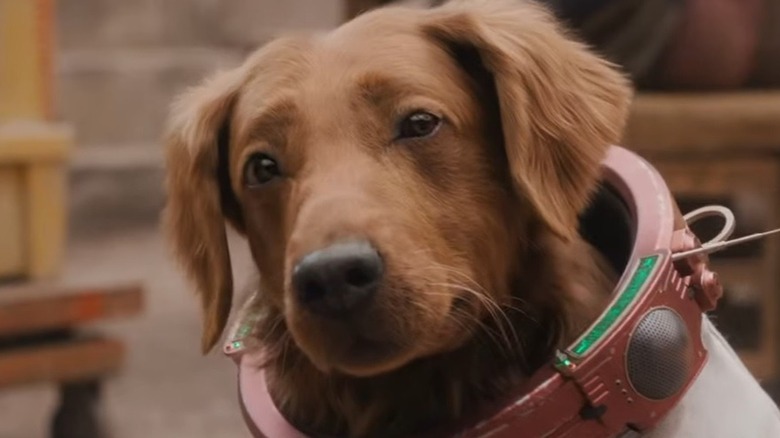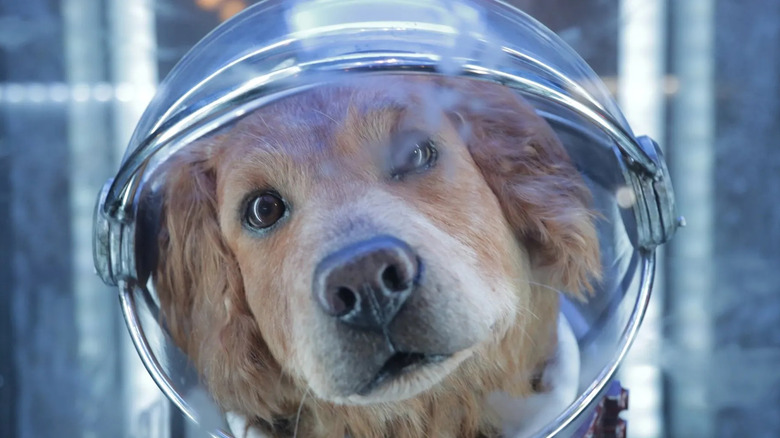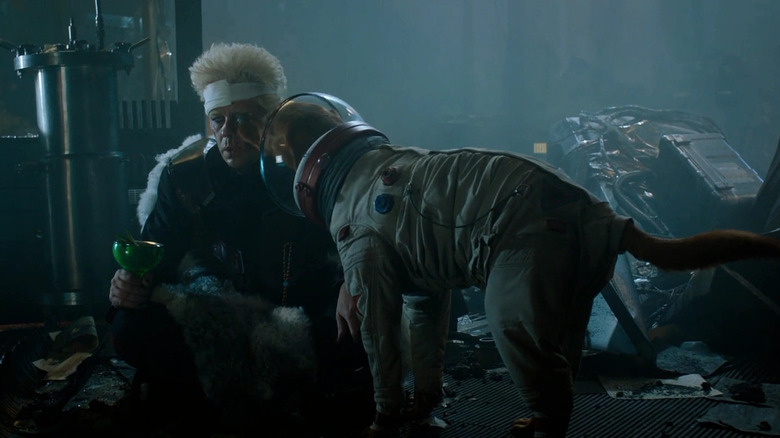James Gunn's Big Change To Cosmo In Guardians Of The Galaxy 3 Was For Good Reason
In James Gunn's 2014 film "Guardians of the Galaxy," the titular heroes visited the museum of the Collector (Benicio Del Toro), an alien being who took pride in amassing the galaxy's rarest trinkets. He kept his collection on display in a series of glass boxes, happy to show visitors around. When the Collector came into possession of an Infinity Stone, a powerful magical rock with explosive properties, it laid waste to most of his collection, but the ensuing explosion also freed an animal: Cosmo, the Soviet space dog. In the first "Guardians," Cosmo was merely a dog that licked the Collector's face. In subsequent sequels, Cosmo would be equipped with a collar that allowed her to speak (her voice was provided by Maria Bakalova) and would eventually discover she had psychokinetic powers.
The character of Cosmo first appeared in Marvel Comics in a 2007 issue of "Nova," and was indeed a talking Soviet space dog salvaged from Earth's past. Cosmo, while not named after an actual dog, was based on the true astral missions that the Soviet Union conducted in the 1950s when they sent actual dogs into space. In the comics, Cosmo was a male dog. In Gunn's "Guardians" movies, Cosmo was gender-flipped. It might seem like an arbitrary decision, but Gunn explained his thinking on his Twitter account. It seems that the director was aware of Cosmo's inspiration, and wanted to, in a small way, pay homage to Laika, the very first dog into space.
Laika
Laika was a part Siberian husky, who was found on the streets of Moscow in 1957. She was immediately enlisted in the Russian space program, and outfitted with electrodes to monitor her vitals. Laika was launched into space on the Sputnik 2 in 1957. For many years, the Soviet Union maintained that Laika remained alive in space several days before dying painlessly. A 2002 investigative report by the BBC revealed, however, that Laika in fact died only a few hours into the mission, likely from a combination of overheating and sheer panic. It seems that Laika's heart rate raced to higher levels than were previously thought, and that it took her far longer to calm down in zero gravity than she did in the centrifuges back on Earth. Life signs terminated about five hours into the flight. A lot was learned from Laika' journey, but she was sadly sacrificed for the knowledge. (For more on Laika, check out this piece by /Film's Valerie Ettenhofer.)
James Gunn knew this story, and wanted to, in some way, honor the poor fallen pooch. When a fan asked him why he changed Cosmo from a male into a female, Gunn — in his straightforward fashion — explained it plainly:
"Because Cosmo is based on Laika, the Russian dog, who was a female, so I gender-swapped her back."
Seems simple. The authors of Marvel Comics turned Laika into a male name Cosmo, so Gunn merely rectified that. It's likely he stuck with the Marvel Comics name just because it was copywritten by the company.
Good girl
Gunn was then confronted by several fans who were sticklers for Marvel Comics fealty. They insisted that Gunn's change to Cosmo was done for no reason and that it merely violated comic book canon. Gunn, who doesn't seem to suffer fools on Twitter gladly, restated his need to honor Laika, and wondered why the complainers were so concerned about it. Especially when he had already drastically altered several other characters from the Guardians of the Galaxy comic books. He tweeted:
"I'd rather honor the real dog who died in outer space. Cosmo would not exist without Laika. By the way, I changed Mantis, Drax, High Evo, and others from humans to aliens, which seems a bigger change. Why does it upset you so much?"
Gunn seemed wary that the people complaining were making their complaints for reasons of sexism, an all-too-common element of online fandom discourse. Those who whine about fealty and purity tend to do so only when a straight white male is being altered. The complaints rarely flow in the opposite direction.
That Gunn chose to highlight Cosmo in "Guardians of the Galaxy Vol. 3" was thematically fitting. A large portion of that movie is devoted to the condemnation of animal testing, and depicts millions of intelligent animals being slaughtered by the High Evolutionary. By featuring Cosmo, Gunn was essentially resurrecting a dog that was shot into space against its will and who died of fright five hours later. Laika died, but for a few moments at least, Cosmo could live on.


